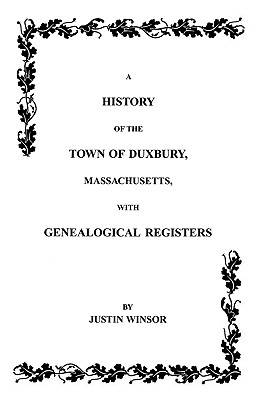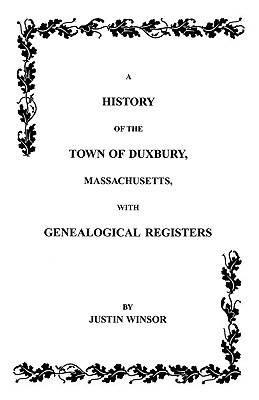
Bedankt voor het vertrouwen het afgelopen jaar! Om jou te bedanken bieden we GRATIS verzending (in België) aan op alles gedurende de hele maand januari.
- Afhalen na 1 uur in een winkel met voorraad
- In januari gratis thuislevering in België
- Ruim aanbod met 7 miljoen producten
Bedankt voor het vertrouwen het afgelopen jaar! Om jou te bedanken bieden we GRATIS verzending (in België) aan op alles gedurende de hele maand januari.
- Afhalen na 1 uur in een winkel met voorraad
- In januari gratis thuislevering in België
- Ruim aanbod met 7 miljoen producten
Zoeken
History of the Town of Duxbury, Massachusetts with Genealogical Registers
Justin Winsor
Paperback | Engels
€ 70,45
+ 140 punten
Omschrijving
Duxbury was founded by migrants from the town of Plymouth, Massachusetts in 1632. Duxbury's importance in Mayflower genealogy is irrefutable, and it is underscored by the simple fact that the town was named for Duxbury Hall, the seat of Miles Standish's ancestral home in England. Justin Winsor's venerable history of Duxbury commences with chapters on the settlement and incorporation of the town; boundaries, roads and landmarks; first settlers; schools and education; and early contact with the Indian population. Subsequent chapters are concerned with lists of 17th-century town officers, Duxbury in the colonial wars, the American Revolution and the War of 1812, and the history of the Congregational Church in Duxbury. Of greatest interest to researchers, over one-third of the volume is devoted to genealogical notes and sketches of more than 200 early families of Duxbury, including the ones that follow: Alden, Arnold, Baker, Barker, Bartlett, Bisbee, Bishop, Bonney, Bosworth, Bourn, Bradford, Brewster, Briggs, Brown, Bryant, Bumpus, Burgess, Carver, Chandler, Chapman, Church, Clark, Cole, Cullifer, Curtis, Cushing, Cushman, Dawes, Delano, Dingley, Drew, Dwelley, Eaton, Ford, Frazar, Freeman, Glass, Hall, Harlow, Hathaway, Holmes, House, Howard, Howland, Hudson, Hunt, Kein, Lambert, Lazell, Leonard, Loring, Louden, Mitchell, Mullins, Nash, Oldham, Pabodie, Partridge, Peirce, Peterson, Phillips, Prince, Prior, Ripley, Rogers, Sampson, Seabury, Shaw, Simmons, Soule, Southworth, Sprague, Standish, Starr, Sylvester, Thomas, Wadsworth, Weston, Winsor, and Wormall.
Specificaties
Betrokkenen
- Auteur(s):
- Uitgeverij:
Inhoud
- Aantal bladzijden:
- 364
- Taal:
- Engels
Eigenschappen
- Productcode (EAN):
- 9780806345277
- Verschijningsdatum:
- 1/06/2009
- Uitvoering:
- Paperback
- Formaat:
- Trade paperback (VS)
- Afmetingen:
- 140 mm x 216 mm
- Gewicht:
- 421 g

Alleen bij Standaard Boekhandel
+ 140 punten op je klantenkaart van Standaard Boekhandel
Beoordelingen
We publiceren alleen reviews die voldoen aan de voorwaarden voor reviews. Bekijk onze voorwaarden voor reviews.









